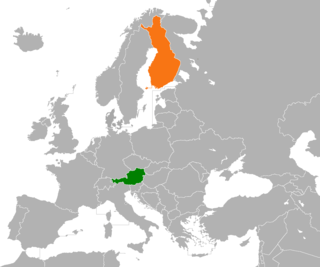 | |
Austria | Turkmenistan |
|---|---|
Bilateral relations exist between Austria and Turkmenistan. Turkmenistan maintains an embassy in Vienna.
 | |
Austria | Turkmenistan |
|---|---|
Bilateral relations exist between Austria and Turkmenistan. Turkmenistan maintains an embassy in Vienna.

Diplomatic relations between the two countries were established on 16 October 1992, during the signing of a joint communique. [1]
The UN resolution on Turkmenistan's neutrality was developed with the assistance of Austria. [2]
On 16 October 2011, the Austrian Federal President Heinz Fischer visited Turkmenistan. [3]

Turkmenistan's declaration of "permanent neutrality" was formally recognized by the United Nations in 1995. Former President Niyazov stated that the neutrality would prevent Turkmenistan from participating in multi-national defense organizations, but allows military assistance. Its neutral foreign policy has an important place in the country's constitution. Although the Government of Turkmenistan claims to favour trade with and export to the United States, and Turkey, its single largest commercial partner is China, which buys the vast bulk of Turkmen natural gas via the Central Asia–China gas pipeline. Turkmenistan has significant commercial relationships with Russia and Iran and growing cross-border trade with Afghanistan. The Government of Turkmenistan often appears to use the conflicting interests of these regional powers as a means to extract concessions, especially on energy issues.

Foreign relations exist between Austria and Japan. Both countries established diplomatic relations in 1869, that lasted until severed in 1914 due to the First World War. Relations were reestablished following the war. Austria has an embassy in Tokyo. Japan has an embassy in Vienna.

Diplomatic relations between Austria and Bulgaria were established in 1879. Austria has an embassy in Sofia and an honorary consulate in Burgas while Bulgaria has an embassy in Vienna and an honorary consulate in Salzburg.

Foreign relations exist between Austria and Finland. Austria recognised Finland on 13 January 1918. Both countries established diplomatic relations on 19 July 1918. Austria has an embassy in Helsinki and 6 honorary consulates. Finland has an embassy in Vienna and 8 honorary consulates . Both countries are full members of the European Union and of the Council of Europe. The two countries became members of the European Union in 1995.

Bilateral foreign relations exist between Austria and Israel. The fact that Adolf Hitler and other perpetrators of The Holocaust came from Austria gives the relationship between the two countries a special relevance. At the same time, the founder of Zionism, Theodor Herzl, also lived in Austria-Hungary and many Israelis are descendants of Austrian Jews. After the founding of Israel, the Second Austrian Republic recognized the Jewish state of Israel shortly after its founding in 1949, before official diplomatic relations were established in 1956. In the 1970s, Bruno Kreisky sought a role as mediator in the Middle East conflict and called for a Palestinian state, which caused disputes with the Israelis. Relations were later strained by the Waldheim affair in the 1980s and the first FPÖ government participation in 2000. After that, the two countries became close allies and established friendly relations. In 2023, Foreign Minister Alexander Schallenberg announced “we have entered into a strategic, extremely close relationship with Israel that can no longer be undone”. Within the EU, Austria is considered one of the most pro-Israeli countries.

Foreign relations exist between Austria and the United Kingdom, and have been positive and friendly since Austrian independence in 1955. Both nations are members of the Council of Europe. The two nations share close economic and technological ties, and cooperate in a variety of fields, particularly when the UK was a member of the European Union and also more recently in condemning Russia's invasion of Ukraine. They have also agreed to cooperate on mutual interests over matters involving security in the Balkans, including regarding Kosovo, Albania and Serbia and furthermore to work together on countering subversive Russian activity in the region. Austria is a European Union member and the United Kingdom is a former European Union member. the United Kingdom is a member of NATO. Austria instead is not a member of NATO.

The 1955 Austrian State Treaty ended the four-power occupation and recognized Austria as an independent and sovereign state. In October 1955, the Federal Assembly passed a constitutional law in which "Austria declares of her own free will her perpetual neutrality." The second section of this law stated that "in all future times Austria will not join any military alliances and will not permit the establishment of any foreign military bases on her territory." Since then, Austria has shaped its foreign policy on the basis of neutrality.

Austria–India relations or Indo–Austrian relations are the international relations that exist between Austria and India.

Diplomatic relations exist between the Republic of Austria and the Federative Republic of Brazil. Both nations are members of the United Nations.